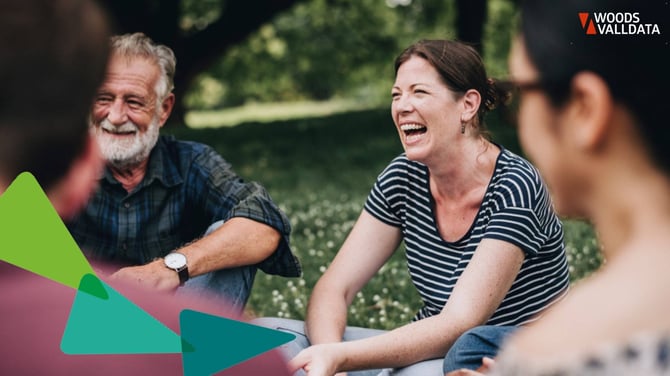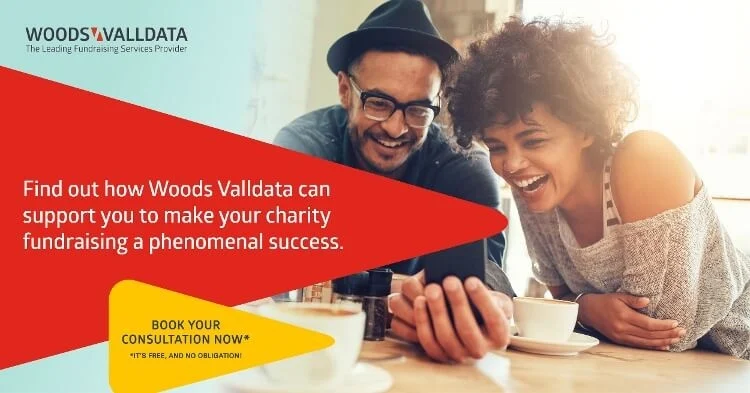
The Art of Retention Mixology
Retention mixology is about the right blend of timing, message, channel and targeting.
Need to meet an income target? Struggling to meet acquisition requirements?
Look to redirect some more budget into retention.
Nurturing your existing supporters will drive a higher life-time value than acquiring new. With over 60% of charities now invested in creating great stewardship journeys for their supporters (according to Woods Valldata’s 2025 Individual Giving Fundraising Survey of 173 responders) and 47% of spend going on retention activities (according to a poll of 111 responders at the 2025 Supporter Journeys and Thanking webinar), it’s now more important than ever to make your supporters’ ongoing experience excellent.
Starting Retention with a Thank You
There’s a lot to look at here and Woods Valldata’s 2025 webinar: Supporter Journeys and Thanking is a great place to start. And the best supporter journeys? Well, they start with great thanking – and at Woods Valldata we’ve got that covered for our charity partners through our SmartThank, part of our charity response handling service.
But then what happens? With so many communication channels available, how do you know which ones to use, when to use them, and for whom?
Welcome to the art of retention mixology—blending the right channels, at the right time, for the right people. Getting retention right isn’t just about sending more messages; it’s about sending the right message, in the right way, to the right supporter.
You can listen in to what our expert panel had to say by watching the webinar on demand or read on. Here’s a quick summary of what’s to come:
- Don’t over communicate
- Use your data
- Personalise – not just the communication but the plan
- Automate, test, optimise
- Apply measurement, and review
The Channel Challenge: Not Just More, But Smarter
The temptation to use every available channel—email, direct mail, SMS, social media—is strong.
Jessica Hosseiny, Head of Retention and Development at Shelter talked through this as one her top tips for creating great supporter journeys and thanking, “Prioritising our comms, so not bombarding or over-communicating on many, many channels, is key. Multi-channel is fine, but you need to identify key messages and not send mixed messages at the same time.”
The lesson? It’s not about quantity, but quality. Supporters are everyday people, likely interested in multiple things, but they don’t want to be overwhelmed. As The Commission on the Donor Experience note in their Project 5: The Supporter's Journey document, the best retention programs put the supporter first, tailoring communications to their preferences and journey stage.

Data-Driven Decisions: Knowing Your Supporters
“Looking at what data you’ve got within your CRM is going to be really key,” continued Jessica. Understanding donor motivations, giving frequency, and preferred channels will help create a more personalised supporter journey.
The webinar panel emphasised the importance of collecting first-party data: “What causes are supporters interested in? What channels do they like to hear from us? You won’t get huge responses, but you’ll start to get some over time, and that can guide how you build out your journeys and what content you prioritise.” Said Andrew Sargent, Head of Analysis at Sequoia Insights.
Personalisation and Timing: The Secret Sauce
Personalisation isn’t just a nice-to-have—it’s essential. As Andrew explained, “That's where I think really good support journeys work. They have a plan. They have an overarching journey. But then you personalise, and you adjust them, depending on the supporter.”
The panel’s experience shows that different acquisition channels require different journeys. Digital donors may respond better to digital-first propositions, while direct mail supporters might appreciate a well-crafted thank you letter.
The key is to meet supporters where they are, with timely, relevant communications.
Automation: Making Supporter Journeys Manageable
Automation for charities is not a new approach. But technology is getting smarter and charities are now increasingly able to utilise automation in their stewardship strategy.
“Automation has been around a while, but it’s getting cheaper and more commonplace,” says Andrew. “Otherwise, all your time would be taken up doing selections and sending things out. Automation makes it manageable, but don’t just automate and forget—check in at different points.”
The best programs combine automation with regular review and optimisation. Testing timing, messaging, and channel mix ensures journeys stay effective as supporter needs evolve.

Testing and Learning - The Path to Optimisation
Retention isn’t static—it’s a process of continuous improvement. The panel shared examples of A/B testing and control groups to measure the impact of different journeys. “We put in place a ring fence for six months for new sponsor-a-puppy donors, ensuring they just got their journey. The control group got the next communication in the activity plan. We found a better ROI by focusing on the journey.” Chris Allum from Guide Dogs shared.
Testing helps charities find the sweet spot between individualisation and scalability. As Jessica put it, “There’s somewhere in the middle between the individual and one-size-fits-all. Testing is key to finding that out.”
Overcoming Internal Challenges
The panel acknowledged the complexity of mapping supporter journeys across teams and products. “Everyone is excited about talking to as many supporters as possible, but that means supporters are getting a lot of messages and mixed messages. We want clarity over what is the right message, time, and channel,” explained Jessica.
Collaborative planning and centralised journey mapping help charities avoid silos and ensure consistency. After-all, the supporter is an individual and their experience of your charity is not by department, but as an overall entity.
Measuring Success: Lifetime Value and Engagement
Retention isn’t just about keeping donors—it’s about increasing their lifetime value. The panel uses tools to track historic lifetime value, break-even points, and ROI over five years. This, in turn, helps build the case for further investment in both retention and acquisition. Andrew points out that “if our donor retention is good and our average gift is good, it gives us more license to push acquisition marketing harder.”
Engagement metrics—open rates, opt-outs, cross-sell rates—are also vital indicators of journey effectiveness. When you’re putting your programme together, remember to integrate your measurement criteria and tools. Think about what is most important for you to learn now, and over time.
Final Thought: Mixology in Action
Getting retention right is a blend of art and science. It’s about understanding your supporters, choosing the right channels, personalising communications, and continually testing and optimising. As the Webinar panel demonstrated, the charities that thrive are those that put supporters first, embrace data and automation, and never stop learning.
So, whether you’re just starting out or refining a mature program, remember: the right mix makes all the difference.
Ready to Take Your Supporter Journeys to the Next Level?
Getting the mix right is easier with the right partner. Woods Valldata’s Response Handling Services support large-scale fundraising programmes, ensuring every supporter receives timely, accurate, and compliant communications. For smaller and medium-sized charities, ResponseGo offers a simple, scalable, and affordable solution—making professional response handling accessible to all.
When it comes to thanking, SmartThank takes the complexity out of personalised acknowledgements. With hundreds of variable text options, SmartThank ensures every supporter feels valued, driving loyalty and repeat giving.
And for the wider journey? Why not reach out to a specialist like Sequoia Insights who will help you develop a journey that works for you and your supporters.
Contact Woods Valldata today to learn more about our Response Handling, ResponseGo, and SmartThank solutions. And don’t forget to watch our Supporter Journeys & Thanking webinar on demand for even more expert insights!
Categories
- charity fundraising (55)
- Income Generation for Charities (43)
- Lottery (41)
- Raffle (37)
- Appeal response handling (33)
- Response Handling (31)
- fundraising insights (24)
- charity gaming (20)
- Fulfilment (18)
- charity insights (17)
- charity raffle (17)
- Compliance (12)
- creating a fundraising strategy (12)
- Company News (11)
- benchmarks (10)
- Direct Debit (9)
- Services (8)
- Gambling Act (5)
- supporter experience (1)
Archives
- March 2020 (5)
- May 2022 (4)
- October 2022 (4)
- January 2023 (4)
- June 2023 (4)
- May 2024 (4)
- June 2024 (4)
- January 2026 (4)
- March 2021 (3)
- April 2021 (3)
- July 2023 (3)
- August 2023 (3)
- April 2024 (3)
- July 2024 (3)
- November 2025 (3)
- June 2020 (2)
- August 2020 (2)
- October 2020 (2)
- November 2020 (2)
- November 2021 (2)
- January 2022 (2)
- February 2022 (2)
- February 2023 (2)
- March 2023 (2)
- September 2023 (2)
- December 2023 (2)
- February 2024 (2)
- March 2024 (2)
- February 2025 (2)
- July 2025 (2)
- December 2025 (2)
- June 2015 (1)
- November 2017 (1)
- February 2020 (1)
- April 2020 (1)
- May 2020 (1)
- July 2020 (1)
- September 2020 (1)
- May 2021 (1)
- June 2021 (1)
- August 2021 (1)
- September 2021 (1)
- October 2021 (1)
- December 2021 (1)
- March 2022 (1)
- April 2022 (1)
- June 2022 (1)
- July 2022 (1)
- August 2022 (1)
- September 2022 (1)
- December 2022 (1)
- May 2023 (1)
- October 2023 (1)
- November 2023 (1)
- January 2024 (1)
- September 2024 (1)
- January 2025 (1)
- March 2025 (1)
- September 2025 (1)
- October 2025 (1)
- February 2026 (1)
